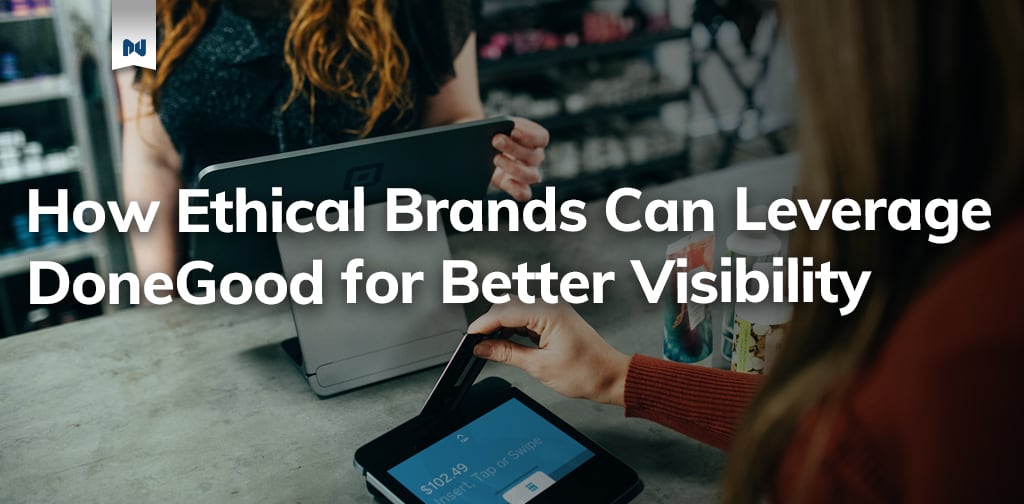For a long time, consumerism has earned a reputation as being the bane of humanity’s existence. And to a certain extent, that reputation is well deserved. But could it also be a way to drive change in the world?
If 2020 has shown us anything, it’s that consumers gon’ consume. With ecommerce blowing past projections in categories that extend well beyond essential goods, one thing is clear: people, no matter what is going on in the world, will always find a way to shop.
One company is leveraging that need to scratch an itch as a way to get ethical brands the exposure they need to sustain their profit model.
Meet DoneGood.
The Business Case for Building An Ethical Brand
Ironically, what started as a conversation around millennials destroying the economy has turned into an eye-opening look at why. Generationally, this consumer segment has been disillusioned by the environmental and social impacts of capitalism, and while they still participate, they’re spending their money in a very interesting way.
Across the board, reports are showing that younger consumers are more likely to spend money on brands who they see as a force for good in the world. Though they’re statistically poorer than the generations before them, they’re spending their money more intentionally, buying less for the sake of spending more where it counts.
One survey found that 88% of consumers want brands to help them live more sustainable lifestyles. And the numbers support the idea that consumers are putting their money where their mouth is.
In a study done by NYU Stern’s Center for Sustainable Business, a whopping 50% of CPG growth came from sustainability-marketed goods, and grew at a rate 5.6 times faster than their non-eco-friendly competitors.
In short, it’s working, and if your brand falls into this category, all that remains is to make sure you’re being seen.
How to Use DoneGood for Better Brand Visibility
The trouble with many sustainable products is that they’re so new, there’s little awareness that these solutions even exist for consumers. Influencers, media outlets, and a strong marketing campaign are essential to getting these products the coverage they need to cover the enormous costs of innovation in manufacturing.
Enter DoneGood, the platform that has made it their mission to point consumers to ethical alternatives to the products they use and buy every day. With a thorough vetting process, DoneGood’s team tirelessly qualifies ethical brands to add to their catalog, making it easy for consumers to take everyday action to support the values that matter most to them.
DoneGood functions in two ways:
- As a digital catalog, with links that take shoppers to a brand’s site to make a purchase, and
- As a Chrome extension that makes intelligent recommendations for alternatives while a user shops on their browser
DoneGood offers shoppers who use their platform exclusive discount codes and a more straightforward way to find brands shaping a better world.
Does Your Brand Qualify for DoneGood?
DoneGood maintains that there isn’t a specific set of criteria they’re looking at when qualifying brands for their platform. They recognize that ethical brands take many forms and try not to let perfection hinder brands who are nonetheless making great strides from getting the benefit of their platform’s representation.
Interested brands can start by filling out the Brand Application. After that, the Director of Brand Partnerships at DoneGood reviews the application to determine whether you’ll be a good fit for the platform. If things look good, you’ll get a meeting with the company, where they’ll ask you deeper questions related to your brand’s ethos and operations.
During the initial meeting, you can expect to cover topics like:
- Your brand’s social impact
- Worker compensation and conditions
- Manufacturing practices
DoneGood says that they’re particularly drawn to brands with third-party certifications but that they also recognize that these certifications can be cost-prohibitive for up and coming brands.
You can get a full list of DoneGood’s brand criteria here.
Visibility=Profitability=Sustainability
Ethical brands deserve a fighting chance, and the best news in the whole world is that consumers are willing to give it to them. They’re willing to pay more, they’re willing to learn how to use new products, and they’re willing to give up quantity for quality.
But you have to show up for them. They need to be able to find you and they need to be able to shop your products with all of the convenience and accessibility of Amazon.
Ethical D2C brands have more than a fighting chance – they have consumers on their side.

